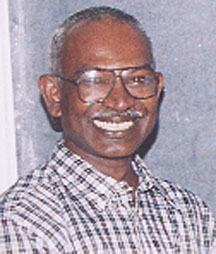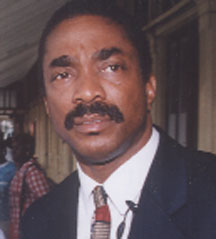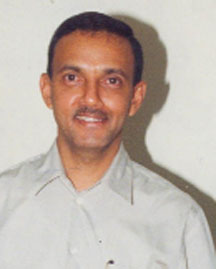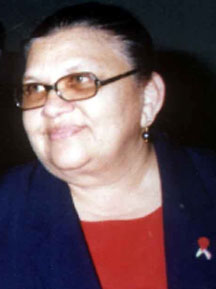Work on local government reform legislation—expected to lay the foundations for the holding of polls due since 1997—has hit another roadblock as the government and opposition are at an impasse on which side should chair the parliamentary committee that has been set up to drive the process forward.
The first meeting of the Special Select Committee to address four local government bills presently before the National Assembly ended in a stalemate over the chairperson and the government has signalled its intention not to take the bills back to House if it does not chair the committee.
The meeting, held on November 28, was chaired by Speaker Raphael Trotman and saw the government nominate Minister of Local Govern-ment Ganga Persaud to be chairperson, while the opposition put forward APNU MP Basil Williams. After the four members that were present for each side supported their respective nominee, Trotman was forced to adjourn the meeting.
Present at the meeting were Persaud, Neil Kumar, Bibi Shadick and Gail Teixeira for the government and APNU MPs Williams, Ronald Bulkan, Joseph Harmon and Amna Ally for the opposition. AFC committee member Dr Veerasammy Ramayya was absent from the meeting as he was out of the country.


In an interview with Sunday Stabroek, Minister Persaud explained that the committee was stalemated because the combined opposition—which has five of the nine members on the committee—sought to have one of its Members of Parliament be the chairperson
Persaud, however, signalled that the government would not proceed with the bills if it does not chair the committee.
He said that it has “never happened in the history of this country” that the government pilots a bill then sends it to select committee and does not chair the committee to examine it.
“If someone takes the baton from you in the committee and if it is a not a minister, then that bill cannot be presented back to the parliament. Who is going to take it through? That would not be the work of the minister? That is a strange happening,” Persaud said, while calling the development “significant.”
According him, the meeting was postponed indefinitely and now they have to await the Speaker to reconvene as he has the responsibility for calling another meeting.
Asked what would be the government’s next move should the opposition vote for Williams to chair the committee, Persaud said that they “would look at that when it comes, let’s see what happens and hope that good sense prevails and the opposition would respect tradition.”
Moving forward


However, Williams told this newspaper that the opposition believes that the government has had control of the process for the last 12 years and has not shown any interest in advancing it. “They have not had local government elections in 18 years and we believe it is time that the opposition, with the majority, be allowed to move the process forward,” he said.
According to Williams, APNU promised that it would effect local government reform and that is what it intends to do. He said the opposition believes that should Persaud chair the committee, there will not be reform since the government does not seem interested. He pointed out that Persaud as Local Government Minister has been moving through the country and installing “dubious” interim management committees (IMC), replacing the Neighbourhood Demo-cratic Councils (NDCs) that were voted in by citizens. He also pointed out that overseers have been “manipulated” by the minister solely for the purpose of carrying out the mandate of the ruling party.
“We have no confidence in the government… we strongly oppose the government chairing the committee,” he said.
Bulkan, meanwhile, told Stabroek News that the government is just delaying the inevitable as Dr Ramayya would cast his vote for the opposition’s nominee. He explained that he had indicated at the meeting that he was in touch of with Dr Ramayya, who had conveyed to him that he supports Williams as the chair of the committee but this was met with a level of incredulity by the government side.
“It is not difficult for them to recognise that once the meeting is fully-constituted, which is going to happen shortly, then the opposition would determine who will be the chairperson of the committee and all they are doing is that they are delaying the work of the committee,” Bulkan said.
Bulkan noted that the work of the committee is to refine the bills, remedy any deficiencies and out of a consensus process have them re-tabled for passage, which would pave the way for local government elections.
“I see no reason why by the end of January we can’t have consensus on the four bills within the parliamentary select committee and it would then be in the hands of the government again to take it back to Parliament,” he said, while stressing that the government is the minority in the House although it is behaving as if it is the majority.
He added that if the government seeks to procrastinate after the select committee had refined the bill, then the opposition would have to seek to put pressure for them to return the bills to the House. He said the government by delaying the inevitable of the opposition chairing the committee is in actual fact delaying the work of the committee.
According to Bulkan, President Donald Ramotar, who in his actions is seeking to “delegitimize the authority of Parliament,” does not recognize that he runs the danger of “delegitimizing both the government and himself as president because he derives his authority from the Consti-tution and the elections.”
‘Revolution’
Meanwhile, former Opposition Leader Robert Corbin, speaking recently on a talk show Plain Talk, noted that there has been postponement of local government elections on 16 occasions. He said for more than a decade the parties agreed that there should be no local government elections unless there were reforms and that it is not better to have the elections without these reforms.
“It is useless and a waste of time to hold local government elections under the present system where the Minister of Local Government can fire the entire staff of the George-town City Council, direct that the decisions taken by an elected-council be disregarded and manipulate the functions of the Georgetown City Council. What’s the point of elections?” Corbin asked.
He said attention should be focused on bringing about the changes that would make elections a reality.
According to Corbin, the opposition and government had reached the point where legislation was being drafted to implement the recommendations of the Task Force on local government reform and to decide to hold elections under the old system after all the consultation “will be to negate all the work that has been going on in the last decade. And I say, hold no elections. Let’s have a revolution over new local government elections under a reformed local government system.”
The four bills that are to be examined by the committee are the Local Government Commission Bill and the Local Government (Amend-ment Bill); the Fiscal Transfers Bill and the Municipal and District Coun-cils (Amendment) Bill.
The government and opposition parties had previously agreed on the enactment of reforms prior to the holding of local government elections, which have been due since 1997. The bi-partisan Task Force on Local Government Reform, made up of representatives of the PPP/C and the PNCR, had worked for eight years on completing the reform legislation. However, in 2009 the government abandoned the process in favour of the parliamentary review, which government hopes would see the holding of the polls.
All four bills were tabled in that same year and sent to select committee for a review, but the process stalled after the opposition parties withdrew their participation, saying that the government was “inflexible” on proposed amendments.
With the opposition now in control of the National Assembly, it is likely to use the select committee review of the bills to strip away provisions in the legislation that give significant discretionary powers to the Local Government Minister. But even with the passage of such legislation by the National Assembly, its enactment would require President Ramotar’s assent.
The Local Government Commission Bill—which had been passed in the last parliament in the absence of the opposition but not assented to by then President Bharrat Jagdeo—is intended to set up the local Government Commission to deal with all matters related to regulation and staffing of local government organs and resolve disputes within and between such organs, in keeping with Article 78 (a) of the Constitution. The Commission’s specific functions include monitoring and reviewing the performance and the implementation of policies of local government organs.
Retained from the previously tabled bill is Clause 4 (1), which deals with the method for the appointment of the six members of the commission, which the opposition had opposed.
The bill states that three members are to be appointed by the President, in accordance with his own deliberate judgment; two members are to be appointed by the President after consultation with the Opposition Leader; and one other member is to be appointed by the Local Government Minister, after consultation with local democratic organs.





